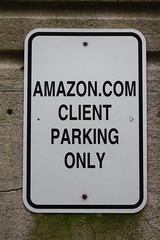
- Image by j_bongio via Flickr
Yesterday, I discussed the notion of the Systems Age and how it will subsume the Information Age we creatures of publishing and information management have thrived in. With the environment shifting to one in which our survival skills may leave us lower on the food chain than we’re accustomed, how can we adapt?
Once again, I’ll harp on the cliche of “if you can’t beat ’em, join ’em.” With a shift as profound as this, systems like Google, Amazon, iTunes, Facebook, and the like are already eating our proverbial lunches.
And some publishers are joining ’em.
Mike Elgan recently wrote along these exact lines with a post entitled, “Book Publishers: You Can’t Beat Amazon . . . So Join ‘Em.” Elgan lays out his argument using the East Coast and the West Coast as contrasting styles of dealing with the changes — East Coast as the incumbents clinging to their traditional value propositions, West Coast as the disruptors creating new value and developing improvement trajectories. For the East Coast incumbents, he has this to offer:
The New York publishing giants cannot beat Amazon without changing. If they do nothing, major publishers will become minor, and Amazon will rise to own the industry. As more people buy books online and electronically, the advantages of traditional publishing will be whittled away.
The center of Elgan’s observations is the ascendancy of self-published authors and books, which Amazon supports just as well as they support best-selling, traditionally published authors. For small money, a self-published author can compete well for readers, while traditional publishers haven’t changed the slow, inefficient, mimicry-laden, expensive consignment publishing model. But all is not well for either the incumbents or the disruptors. In fact, they are stronger together. As Elgan puts it:
The core problem in publishing today is this: Book publishers have a floor, and self-publishers have a ceiling. Book publishers feel they can afford only to invest in sure-thing mega-hits. But they know there’s gobs of talent out there they’re turning away. Meanwhile, the best self-published authors — who would be bestsellers with a book deal — can only sell so many books or get so much exposure because they simply can’t marshal the resources. Big publishers can’t afford small sales, and self-publishers can’t afford big sales. There’s a barrier. And the elimination of that barrier is the key to survival for the book industry.
The lesson about how publishers can survive? By not fighting the trend, but by entering the fray and bringing their advantages to it (editors, designers, marketing specialists).
In a recent, unrelated Business Week blog entry, Ben Kunz talks about the upcoming Apple Tablet (the “Jesus Tablet,” as he calls it), and how it may revolutionize the publishing space — if only publishers are willing to play the same game as the systems people. This means making content available, integrating e-commerce to recapture the paid model, and changing content offerings to suit the Systems Age.
Pressures will mount on publishers to deal with applications, augmented reality approaches, data feeds, and system-level implementations of all sorts. Whether this means more back-end systems, more front-end systems, or both, publishers will need to invest in systems, not content. Content is cheap and easy to get and make compared to systems in this age. (Note: I said “compared to.” I’m not arguing that content is cheap and easy to get so that is should be free or anything like that — I’m saying that systems are comparatively expensive and hard to scale, due to novelty, scope, unfamiliarity, and many other factors [lack of standards, rapidly evolving customer needs and expectations, and more].)
This brings me back to the Systems Age concept again. The Amazon Kindle may look like a device, but it’s really an extension of the Amazon storefront — just look at how important the wireless feature is, how “Kindle” on the PC and iPhone exists outside the device, etc. Google is a set of systems, from a search system to a mapping/GPS system, and now a smartphone extension (Android). Facebook is a system of apps, the iPhone is a system of apps, etc.
Publishers need to start acting like system-wielding businesses instead of content repositories. Otherwise, they will be curiosities in the tar pits of the Systems Age, and soon enough, the crude oil these systems use to fuel their vehicles.
Discussion
3 Thoughts on "Fighting Fire with Fire — The Only Remaining Option?"
Interesting thesis about self-published books on Amazon, but how well do they actually do, compared with books that have a marketing budget behind them?
I would not agree that “self published” books are in an ascendancy. I would suggest that print-on-demand will become a more popular and economical medium for publishers and possibly authors, but that is not the same thing as “self published” (most of which is dire I suspect).
Interesting discussion–thanks for keeping it going. STM publishing, which has thrived in recent decades, could of course be called a “system” itself. The new system (Google, Web 2.0, etc.) may disrupt the business model of the old system, but as David Crotty commented, the value of content issue is a matter of definition. The billions of dollars that are invested in the research that forms the basis of scholarly publishing is one measure of the value. Many of the traditional publisher functions–including peer review, editing, and design–are just as valuable now, even if the indexing and dissemination functions are altered by new systems. And providing this value costs something. Publishers are currently still the best equipped organizations to consistently provide this added value. As business-as-usual is disrupted by new systems, the funding mechanisms may need time to adjust to new ways of ensuring that the essential publisher functions are supported.
Reading this, I’m taken straight back to Tim O’Reilly’s original paper on Web 2.0. If you haven’t read it, your really should. Very Carefully. More than once. There are a number of profound insights in the paper. One of them – the ‘Network Effect’ is the one to really get your head around. It isn’t an easy concept to grapple with. The network effect can only occur when multiple factors converge to enable it to happen (eg Google, -a great search algorithm + the use of cheap hardware + the use of open source software + stored search feedback from the userbase + luck[right time right place etc etc]) Even then it isn’t a certainty to occur.
If it does happen, you have one choice – to jump on board and see where it goes. This is what Bezos did back in the 90s and early 2k’s when Amazon regularly headed the lists of web companies that were going to go belly up. He has played a long game. So have Apple under Steve Jobs and Google as well. What do they have in common? VERY strong leadership who are not motivated to trade short term gain for their long term plans. I wonder if that thinking is an east coast – west coast difference?
![Reblog this post [with Zemanta]](http://img.zemanta.com/reblog_e.png?x-id=7079ceab-13f7-43a2-b8e6-0175a91d6ea5)


